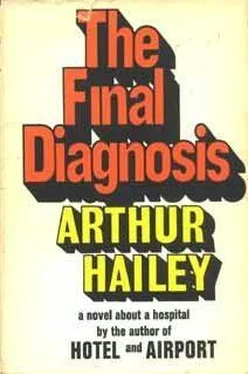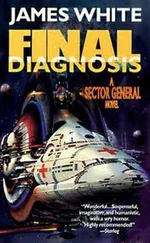Arthur Hailey - The Final Diagnosis
Здесь есть возможность читать онлайн «Arthur Hailey - The Final Diagnosis» весь текст электронной книги совершенно бесплатно (целиком полную версию без сокращений). В некоторых случаях можно слушать аудио, скачать через торрент в формате fb2 и присутствует краткое содержание. Жанр: Триллер, на английском языке. Описание произведения, (предисловие) а так же отзывы посетителей доступны на портале библиотеки ЛибКат.
- Название:The Final Diagnosis
- Автор:
- Жанр:
- Год:неизвестен
- ISBN:нет данных
- Рейтинг книги:4 / 5. Голосов: 1
-
Избранное:Добавить в избранное
- Отзывы:
-
Ваша оценка:
- 80
- 1
- 2
- 3
- 4
- 5
The Final Diagnosis: краткое содержание, описание и аннотация
Предлагаем к чтению аннотацию, описание, краткое содержание или предисловие (зависит от того, что написал сам автор книги «The Final Diagnosis»). Если вы не нашли необходимую информацию о книге — напишите в комментариях, мы постараемся отыскать её.
The Final Diagnosis — читать онлайн бесплатно полную книгу (весь текст) целиком
Ниже представлен текст книги, разбитый по страницам. Система сохранения места последней прочитанной страницы, позволяет с удобством читать онлайн бесплатно книгу «The Final Diagnosis», без необходимости каждый раз заново искать на чём Вы остановились. Поставьте закладку, и сможете в любой момент перейти на страницу, на которой закончили чтение.
Интервал:
Закладка:
There was a light tap on the door and Mrs. Loburton came in. Seeing her, suddenly Vivian forgot that she was all of nineteen, adult, able to decide things for herself. She held out her arms. “Oh, Mother,” she said, “I’m so terribly mixed up.”
The physical checkups on food handlers were proceeding briskly. In a small consulting room—the first of a row of similar rooms in the outpatients’ department—Dr. Harvey Chandler was concluding his examination of one of the male cooks. “All right,” he said, “you may get dressed.”
At first the chief of medicine had not been sure whether it would be dignified for him to handle some of the physicals himself or not. But eventually he had decided to, his attitude being somewhat that of a commanding officer who feels morally bound to position himself at the head of his troops during a beach-head assault.
Actually Dr. Chandler had been inclined to resent the dominance of the situation up to this point by Drs. O’Donnell and Pearson. O’Donnell was, of course, the medical-board president and entitled to be concerned with the over-all welfare of the hospital. All the same, Chandler reasoned, he was merely a surgeon and typhoid was essentially a matter for internal medicine.
In a sense the chief of medicine felt deprived of a starring role in the present crisis. In some of his more ultimate thoughts Dr. Chandler sometimes pictured himself as a man of destiny, but opportunities to prove the point were all too rare. Now, with an opportunity at hand, he was being relegated, if not to a minor role, at least to a secondary one. He had to admit, however, that the arrangements made by O’Donnell and Pearson appeared to be working well, and at least they all had the common aim of ending this deplorable outbreak of typhoid. Frowning slightly, he told the cook who had now dressed, “Remember to be especially careful about hygiene. And practice absolute cleanliness when you’re working in the kitchen.”
“Yes, Doctor.”
As the man went out Kent O’Donnell came in. “Hi,” he said. “How’s it going?”
Chandler’s first inclination was to reply huffily. Then, he decided, perhaps there was not really that much to be concerned about. And apart from the minor fault of O’Donnell’s being—in Chandler’s opinion—a little too democratic at times, he was a good man to have at the head of the board and certainly a big improvement over his predecessor. Therefore, amiably enough, he answered, “I lost count some time ago. I suppose we’re getting through them. But there’s nothing to show so far.”
“What’s the news of the typhoid patients?” O’Donnell asked. “And the four suspected cases?”
“You can make it four definite now,” Chandler said, “and scratch two of the suspects.”
“Anyone in danger?”
“I don’t think so. Thank God for antibiotics! Fifteen years ago we’d have been in a lot more trouble than we are.”
“Yes, I suppose so.” O’Donnell knew better than to inquire about isolation procedure. For all his pompousness Chandler could always be relied on to do the correct thing medically.
“Two of the patients are nurses,” Chandler said. “One’s from Psychiatry, the other from Urology. The other two are men—a generator-room worker and a clerk from the records office.”
“All from widely separated parts of the hospital,” O’Donnell said thoughtfully.
“Exactly! There’s no common denominator except hospital food. All four took their meals in the hospital cafeteria. I don’t think there’s any question that we’re on the right track.”
“Then I won’t hold you up,” O’Donnell said. “You’ve two more people waiting outside, but some of the other men have more, and we’re shifting them around.”
“Very well,” Chandler said. “I’ll just keep going until we’re clear; nothing must stop us—no matter how long it takes.” He sat in his chair a little straighter. He had the feeling that there was a touch of derring-do and a ring of Old Glory to his own forthright words.
“Right you are,” O’Donnell said. “I’ll leave you to it.”
A little piqued by the casual reaction, the chief of medicine said stiffly, “You might ask the nurse to send in the next one, will you?”
“Sure.”
O’Donnell went out, and a moment later a girl kitchen worker entered. She was holding a card.
Chandler said, “I’ll take that. Sit down, please.” He put the card in front of him and selected a blank case-history sheet.
“Yes, sir,” the girl said.
“Now, first I want your medical history—yourself and your family—as far back as we can go. Let’s start with your parents.”
With the girl responding to his careful questioning, Chandler’s rapidly written notes began to fill the sheet in front of him. As always, when he was finished the result would be a model of good case-history reporting, suitable for inclusion in any medical textbook. One of the reasons Dr. Chandler was chief of medicine at Three Counties was because he was an extremely precise and conscientious clinician.
Walking away from the commandeered outpatients’ department, Kent O’Donnell permitted himself to think, for the first time with any degree of perspective, of some of the day’s events so far. It was now midafternoon, and since this morning so much had happened that it had been impossible to grasp the implications of it all.
In swift and unexpected succession had come, first, the incident of the mis-diagnosed child and, shortly afterward, its death. Then there had followed: Pearson’s firing, Charlie Dornberger’s retirement, the discovery that an elementary hygiene precaution had been neglected in the hospital for more than six months, and now the occurrence of typhoid, with the threat of an even graver epidemic hanging over Three Counties like an avenging sword.
So much, it seemed, had broken loose at once. Why? How had it happened? Was it a sudden symptom of a malaise that, undetected until now, had gripped the hospital? Was there more to come perhaps? Was this the signal of a general disintegration soon to follow? Had they all been guilty of a sense of complacency—of which O’Donnell himself might be the instigator?
He thought: We were all sure, so sure, that this regime was better than the last. We worked to make it so. We believed we were creating and progressing, building a temple of healing, a place where good medicine would be learned and practiced. But have we failed—ignominiously and blindly—through the very goodness of our own intentions? Have we been stupid and unseeing—our eyes on the cloud tops, uplifted by the glister of ideals, yet ignoring the plain earthy warning of everyday events? What have we built here? O’Donnell searched his mind. Is it, in truth, a place of healing? Or have we raised, in folly, a whited sepulcher—an empty, antiseptic shrine?
Preoccupied, his thoughts burning and intense, O’Donnell had strode through the hospital instinctively, unconscious of his surroundings. Now he came to his office and went inside.
He crossed to the window and stood looking down at the hospital forecourt. As always, there was a movement of people, coming and going. He saw a man limping, a woman holding his arm; they passed beneath and out of sight. A car drew up; a man jumped out and helped a woman into it. A nurse appeared, handing the woman a baby. The doors slammed; the car moved on. A boy on crutches came into view; he moved quickly, swinging his body with the ease of practice. He was stopped by an old man in a raincoat; the old man seemed uncertain where to go. The boy pointed. They moved together toward the hospital doors.
O’Donnell thought: They come to us in supplication, holding faith. Are we worthy of it? Do our successes mitigate our failures? Can we, in time, by devotion atone for error? Shall we ever know?
Читать дальшеИнтервал:
Закладка:
Похожие книги на «The Final Diagnosis»
Представляем Вашему вниманию похожие книги на «The Final Diagnosis» списком для выбора. Мы отобрали схожую по названию и смыслу литературу в надежде предоставить читателям больше вариантов отыскать новые, интересные, ещё непрочитанные произведения.
Обсуждение, отзывы о книге «The Final Diagnosis» и просто собственные мнения читателей. Оставьте ваши комментарии, напишите, что Вы думаете о произведении, его смысле или главных героях. Укажите что конкретно понравилось, а что нет, и почему Вы так считаете.












